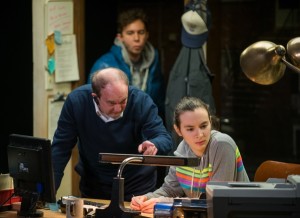NASTY NESTING DOLLS
In Steppenwolf’s new show, it’s the specifics that startle. There’s enough grit here to repave Chicago’s countless February potholes. But, despite its well-rooted situations, Russian Transport could be any immigrant family facing hard decisions between Old Country corruption and an unfulfilled American Dream.
A Chicago debut, Erika Sheffer’s disturbed and disturbing two-act depicts a second-generation Russian clan in Sheepshead Bay, Brooklyn trying to get ahead–or just not be left behind. Director Yasen Peyankov, himself an immigrant from Bulgaria, gives this scary story more than its due, but he can’t escape the impasse at the end: In effect the playwright throws up her hands in despair because, it seems, there’s no way out.
Performed all over Joey Wade’s detailed upstairs-theater set, Russian Transport is a bellicose piece of goods, a foul-mouthed sitcom that soon turns sit-traj (as opposed to sit-com). Its unnamed family is clearly ripe to rot. Whether the dialogue is in Russian or English, the tone alone says trouble. The father Misha (moody Alan Wilder) runs a failing car service. He’s in hock to his ears to some very bad lenders. This makes the martinet mother Diana (Mariann Mayberry, channeling every Mafia wife) very pissed off at Misha’s failure to keep her in fur. (She’s that very American contradiction, a greedy cheapskate.)
Alex, the very Americanized teenage son (Aaron Himelstein who plays young and mad very well), works three jobs’”for Verizon, for dad, and a hidden racket as a low-level drug dealer’”and hates them all. Completing the fractious foursome is 14-year-old Mira (Melanie Neilan), caught in the crossfire and with no adequate role model for miles in any direction. (Neilan also plays three significant human sacrifices, very different immigrants from these Brooklyn expats.)
Into the midst of their morass slinks Uncle Boris (Tim Hopper, all but reinventing the villains of melodrama). Smoldering with sexuality, Diana’s kid brother exudes Moscow’s dog-eat-dog, corner-cutting, take-no-prisoners mentality. His reunion becomes an infection, testing to the breaking point each loved one’s capacity for corruption.
Sheffer throws a string of shock effects into this struggle for survival as we, along with Alex and finally Mira (the parents knew all along), catch on to the get-rich schemes perpetrated by the unspeakable Boris. He may be a serpent, the playwright argues, but this is no garden of Eden: When you’re living on the edge, impatient for life to hand you sheer wealth without consequences, well, your bad choices trigger no-win situations.
A morality tale without the morality, Russian Transport (its double pun referring to both the father’s business and the uncle’s smuggling) is rooted in bedrock dilemmas. These characters seismically register every response to the threats they face on a continuum from complacency to whiteout panic. Sheffer’s potboiler is too honest to sell us a happy ending. So it offers none. Which for many will seem either an easy cop-out or a gutless compromise. But there’s no doubt that Russian Transport presents its problem the way a bomb exposes its components.
photos by Michael Brosilow
Russian Transport
Steppenwolf Theatre Company
scheduled to end on May 11, 2014
for tickets call 312-335-1650 or visit www.Steppenwolf.org
for info on this and other Chicago Theater, visit http://www.TheatreinChicago.com








